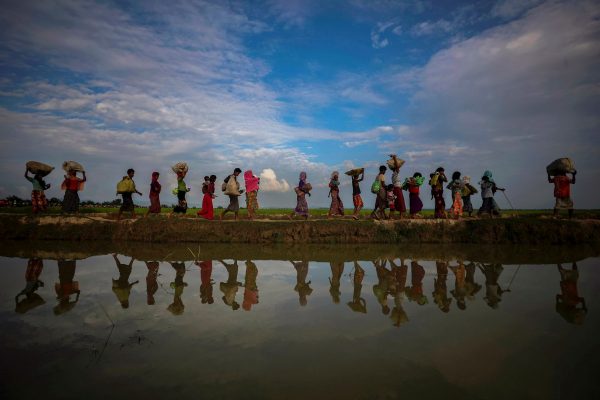This possibility is particularly worrying for the Myanmar Army, charged as it is under Myanmar’s 2008 constitution with responsibility for the situation in Rakhine State and for ‘national cohesion’. But the ARSA has remained near invisible so far and has not demonstrated any capacity to co-opt or lead an insurgency.
To date, the Myanmar government has not been able to mobilise substantial political support from other Rakhine State groups or individuals for its repatriation program. Mobilising this support would require these groups to recognise the economic and social benefits of continued Rohingya presence in Myanmar. This is unlikely given the sharp polarisation of attitudes towards the Rohingya in Myanmar, encouraged in part by some extremist Buddhist groups inside the country. The Myanmar Army’s suspicions about the possibility of terrorist connections developing between some Rohingya and Muslim extremists in other countries is not helping.
The impact of this enormous refugee outflow on Bangladesh — the country of their ‘temporary’ refuge — is severe. Dependent entirely on international humanitarian relief and confined to crowded refugee camps, the Rohingya are segregated from the communities of ethnically similar Bengali citizens that live in the Chittagong area around Cox’s Bazaar, even where familial connections exist. For most Bangladeshi officials, the Rohingya are a foreign community with no permanent roots in Bengali society, whose presence was not sought and whose ongoing wellbeing poses a problem for local institutions.
Bangladesh remains incapable of exerting much political influence over the Rohingya situation. Relations between the two governments are business-like and not especially close. The two militaries have considerable experience dealing with each other over a range of cross-border issues, but probably don’t trust each other greatly.
Myanmar is expected to create a domestic environment that would encourage the Rohingya to return to Northern Rakhine State in the knowledge that they can remain there in health and safety. But this is not happening. Myanmar lacks the financial resources to undertake a mass resettlement program and has so far only received limited international assistance for the repatriation effort.
Myanmar authorities are building new villages for returnees, but they remain empty. Fear exists that some Rohingya might politicise the exodus and jeopardise repatriation efforts. But Bangladeshi leaders, including Prime Minister Sheik Hasina herself, have dismissed the likelihood of Rohingya radicalisation.
The prospects for international intervention are also not promising. Since 2017 Myanmar authorities have denied free access to Northern Rakhine State to all international organisations, including the UN Special Rapporteur on Human Rights and the UN Human Rights Council Fact-Finding Mission (FFM). Publication in September 2018 of the full account of the UN FFM’s worrying report will only increase international pressure for a reasonable, if not enduring, solution.
Unfortunately, more effective regional action, for example through ASEAN, seems unlikely to succeed — Myanmar’s ASEAN neighbours are not disposed to changing their migration policies, which currently do not facilitate better outcomes for the Rohingya.
Relations between Myanmar and the United Nations have often been fragile, but have cooled noticeably in recent years. It is not unreasonable to attribute some responsibility for this cooling to the Myanmar Army, which has formal constitutional responsibility for internal security and border affairs. The Myanmar Army consider the Rohingya to be immigrants in Myanmar, but not necessarily ‘citizens’. It tolerates the Myanmar government’s acceptance of the Rohingya as residents of Northern Rakhine State, but does not fully respect their human rights.
The August 2018 release of the UN FFM report demonstrates the extent of this breakdown in relations. It states that the response of the Myanmar ‘security forces’ to the initial August 2017 protests was ‘immediate, brutal and grossly disproportionate’ and calls for investigations into allegations of ‘genocide, crimes against humanity, and war crimes’.
While the FFM was denied access to Myanmar in 2018 to prepare its report, the FFM team conducted 875 ‘in-depth interviews’ to reach its conclusions. It was these interviews which convinced the FFM of the ‘patterns of gross human rights violations’ and of the considerable ‘pre-planning’ behind the Myanmar military’s intervention.
It is unlikely that the UN Human Rights Council will be able to achieve a breakthrough with the Rohingya without more purposeful Myanmar government support. And the UN Security Council — faced with the prospect of vetos from China and Russia — may choose to avoid an outright confrontation of the Rohingya plight.
The international community could once again look to Aung San Suu Kyi for a stronger commitment to the Rohingya. But her stance remains risk averse, hoping to avoid internal political dissent. Hopes for an enduring solution to the crisis, UN-induced or otherwise, remain dim.
Trevor Wilson is Visiting Fellow at the Department of Political and Social Change, The Australian National University.


The Rohingya have suffered tremendously at the hands of Myanmar’s military, and the people of the nation need to call for constitutional reform to limit the power of the military and ensure the rights of all people, especially minority groups. One urgently needed change is the military’s automatic occupation of seats in the nation’s Parliament without the need to participate in election campaigns. For more insights see the Charter for Permanent Peace.